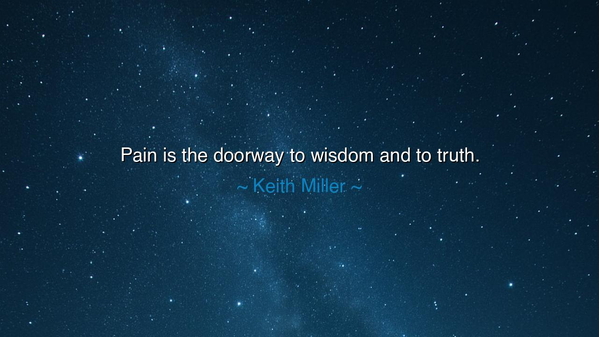
Pain is the doorway to wisdom and to truth.






The writer and teacher Keith Miller uttered a truth carved from the marrow of human experience when he declared: “Pain is the doorway to wisdom and to truth.” In these words is revealed the paradox of existence—that while men flee from pain as from an enemy, it is often the very threshold through which they must pass to find wisdom and truth. For ease breeds forgetfulness, but suffering awakens the soul, sharpening its vision and deepening its understanding of life’s eternal mysteries.
The origin of this teaching lies in the simple observation of human struggle. Pain, whether of the body, the mind, or the heart, strips away illusions. It exposes what is false and reveals what endures. When wealth, pride, or ambition are burned away by trial, the soul is forced to stand bare before itself, and in that nakedness, it learns what truly matters. Thus, Miller calls us not to love pain, but to recognize it as a stern and faithful teacher, whose lessons cannot be found in comfort.
History bears witness in the life of Nelson Mandela, who endured twenty-seven years in prison under the cruelty of apartheid. His chains and hardships were not the end of him, but the crucible that transformed him into a leader of forgiveness and reconciliation. Without pain, he might have remained a politician; through pain, he became a sage. The truth he carried forth—that peace is stronger than vengeance—was born in the long nights of captivity. His story is the living proof that pain is the doorway to wisdom and to truth.
The ancients, too, taught this law of life. The Greeks saw in Prometheus, chained to the rock, a symbol of the suffering that brings fire and knowledge to mankind. The Hebrews told of Job, who through grief and trial discovered the majesty of God and the resilience of faith. From East to West, myths and scriptures agree: it is in the furnace of pain that the soul is tempered, as iron becomes steel.
Therefore, O children of tomorrow, do not despise your pain. Endure it, learn from it, and let it carve you into strength. For each wound can be a window, each trial a gate, each sorrow a doorway leading to greater depth. Only those who pass through suffering with courage can drink deeply of wisdom, and only those who embrace their trials with faith can uncover the shining face of truth.






AHAnh Hong
From a philosophical perspective, this quote touches on something universal—the paradox that pain, though unpleasant, can awaken consciousness. Yet, I question whether truth revealed through suffering is more valuable than truth found through peace. Does struggle inherently make knowledge deeper, or do we just remember it more vividly because it hurts? I’d love to explore whether wisdom requires pain, or if it’s simply one of many paths to it.
HPNguyen Hong Phuc
This idea feels both comforting and challenging. Comforting because it gives purpose to suffering, and challenging because it implies that avoidance of pain might mean avoiding understanding. In an age where we’re encouraged to chase happiness and numb discomfort, this message feels almost radical. Could our obsession with comfort be preventing us from gaining deeper self-awareness and empathy? Perhaps wisdom requires walking through discomfort, not around it.
TDvuong thi thuy duong
Reading this makes me reflect on how often people only begin to question life’s meaning after going through loss or failure. Pain strips away illusions, leaving behind only what’s essential. But I also wonder—does every painful experience hold the potential for wisdom, or does it depend on one’s mindset? Some people grow from suffering, while others become bitter. Maybe truth isn’t in the pain itself, but in how we process it.
KLNguyen Khanh Linh
I find this statement powerful but also somewhat unsettling. If pain leads to truth, does that mean we should welcome suffering or seek it out? That seems dangerous in a world already full of hardship. I think the real message might be about transformation—how the way we respond to pain determines whether it becomes destructive or enlightening. Do you think wisdom can exist without some degree of emotional struggle?
GGinny
This quote resonates deeply with me because it captures how personal growth often emerges from suffering. Still, I wonder—does wisdom always have to come through pain? Can’t love, joy, or curiosity also reveal truth? It feels unfair that hardship is often treated as the only teacher life respects. Maybe what Miller means is that pain forces us to pay attention in ways comfort never does, pushing us to confront what we’d rather ignore.